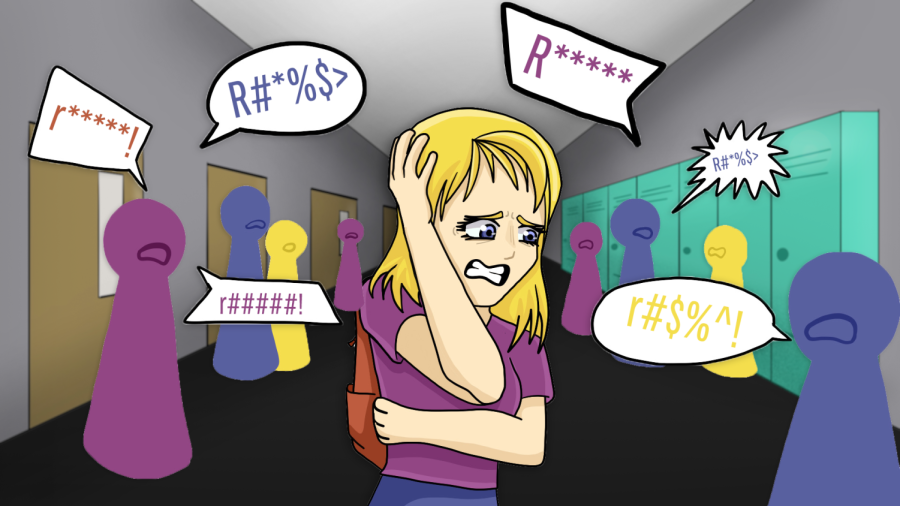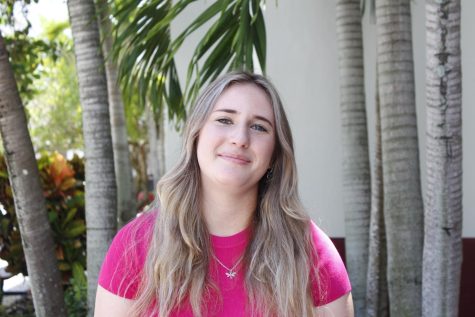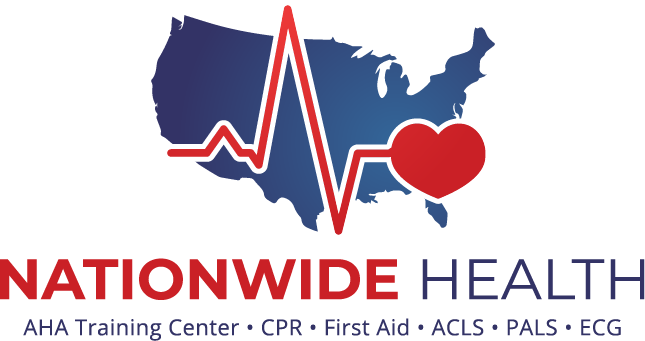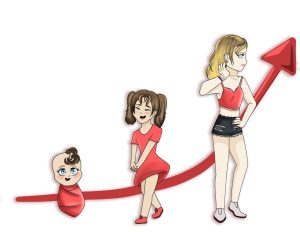R-word remains an offensive slur; perpetuates exclusion of disabled people in society
The R-word is a detrimental term that continues to be heard at MSD
February 22, 2022
Although the term is often tossed around with little consideration of its deeper meaning, the R-word is an extremely hurtful term to the disabled community and should no longer be used in any circumstance.
The use of the insensitive slur has plagued Marjory Stoneman Douglas High School. It can commonly be heard throughout the hallways, at lunch and in class. It is used to call someone or something stupid, but it is immensely hurtful and offensive.
The R-word has an extensive history, originating in 15th century France and stemming from the Latin verb “retardare,” meaning to hinder or make slow. Eventually, the English adopted the term and used it with a similar meaning.
The R-word became a medical term in the 1960s used by the American Psychiatric Association to describe individuals who have intellectual disabilities and an IQ of less than 70.
While the intention of the word was to be used for clinical purposes, in years following that decision, the word took on a new, offensive meaning that causes harm to the special needs community
The term has evolved into an insult being synonymous to “stupid,” “dumb,” “idiot,” etc., but continues to have its ties to the disabled community.
Having transitioned from a neutral connotation to one that is extremely negative, the R-word is now identified as a form of hate speech by the Special Olympics.
The scope of the disabled community encompasses a wide range of people with intellectual, physical and developmental disabilities. The new definition of the word now implies that those with a disability are also “stupid” or “dumb.” This creates untrue and harmful stereotypes towards those with special needs and perpetuates exclusion in our already polarized society.
Children with disabilities are already more likely to be bullied. According to a Kantar Social Listening study, when social media users are posting about people with intellectual disabilities, 7 in every 10 of those posts are negative, and 6 in 10 contain a slur.
Individuals with disabilities may have trouble speaking, solving problems, walking, remembering and understanding social rules. They endure limitations in cognitive functioning and skills which can cause them to fall behind typically developing children and make it harder to complete everyday tasks.
They are not such terms implied by the R-word and should actually be applauded for learning with extra obstacles.
The media has only aided the word’s ever-growing usage. From comedians to movies and TV shows, it is not uncommon to hear the R-word when consuming media.
In a 2018 Netflix special called “Disgraceful,” comedian Tom Segura targeted children and adults with Down syndrome. He used the R-word to garner laughs and mock the Down syndrome community.
When the mother of a child with Down syndrome pleaded with Netflix to take his special down, Segura responded in a tweet claiming that it would be “r******” to take it down.
Making fun of the special needs community and using the R-word is a cheap trick by comedians to get a few laughs at the expense of those who must deal with challenging disabilities.
The 2008 comedy “Tropic Thunder” stirred up controversy after one of the main characters Tugg Speedman, played by Ben Stiller, used variations of the R-word at least 16 times throughout the movie, according to the National Down Syndrome Congress.
Stiller argued that the use of the R-word in “Tropic Thunder” has nothing to do with people who are intellectually disabled, and instead the movie satirizes actors who go to excessive lengths to get “in character.” Whether satire or not, the movie still uses people with intellectual disabilities and the laughter that their stereotypes provoke as a means to make a successful comedic movie.
The media is not exempted from the rest of society and should instead be held to a higher standard. Popular movies and TV shows set an example for society and should make sure they are being inclusive and conscious of their content.
Realizing the harm in using the R-word, there are a multitude of ways that businesses, laws and media have worked to become more inclusive for the special needs community.
In 2010, former President Barack Obama signed Rosa’s Law, a federal law that removed the term “mental retardation” in federal education, health and labor statutes, replacing it with “intellectual disability.” The law was named for Rosa Marcellino, a young woman with Down syndrome whose family engaged in a two-year campaign to change the terminology.
In a White House ceremony, President Obama echoed the words of Nick Marcellino, Rosa’s teenage brother, who said, “What you call people is how you treat them. If we change the words, maybe it will be the start of a new attitude toward people with disabilities.”
Three years later, in 2013, the Social Security Administration signaled that it would eliminate “mental retardation” from its official lexicon as well.
While the government and many organizations have adopted “intellectual disability” as the terminology for official documents, there are additional options. Many people advocate for “people first” language; rather than saying “the disabled,” it is preferable to say “people with disabilities,” “adult with disabilities” or “child with disabilities.”
Other inclusive terms include “a person with a cognitive impairment” or “a person with a cognitive disability.” Rather than referring to services as “handicapped,” it is more inclusive to use the adjective “accessible” to describe buses, parking and bathrooms.
Various campaigns have been created to encourage people to stop the use of the harmful term. One movement, started by the Special Olympics, asks people to pledge to stop using the R-word, with a campaign each march to “Spread the Word to End the Word.”
One of the best ways to stop the use of the R-word is to hold those around you accountable and to educate them on why the word is harmful.
While there should be harsher punishments in school if the word is said by students, there also needs to be stricter repercussions at home. Parents must teach their children appropriate terms, just as you would to stop them from saying any other slur.
In order to eradicate this word, we must all work together and stand in solidarity with people who have disabilities.
This story was originally published in the February 2022 Eagle Eye print edition.












